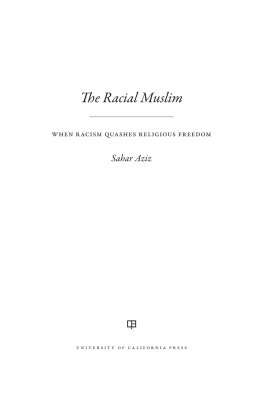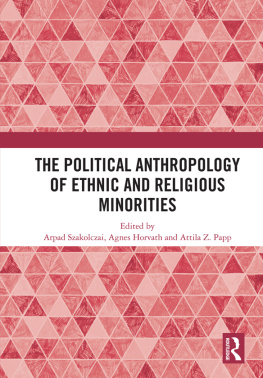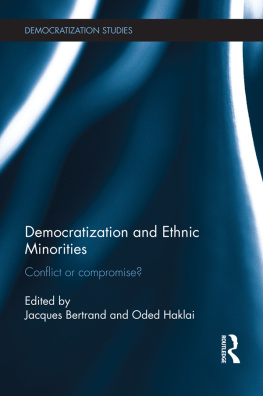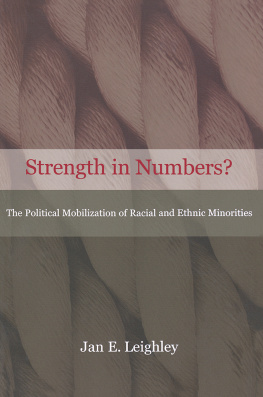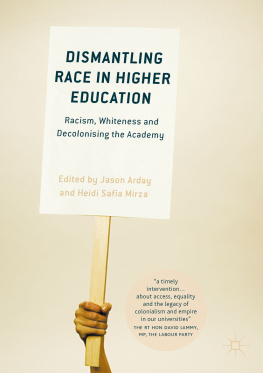Political Blackness
in Multiracial Britain
THE ETHNOGRAPHY OF POLITICAL VIOLENCE
Tobias Kelly, Series Editor
A complete list of books in the series
is available from the publisher.
Political
Blackness
in Multiracial
Britain

Mohan Ambikaipaker

Copyright 2018 University of Pennsylvania Press
All rights reserved. Except for brief quotations used for purposes of review or scholarly citation, none of this book may be reproduced in any form by any means without written permission from the publisher.
Published by
University of Pennsylvania Press
Philadelphia, Pennsylvania 19104-4112
www.upenn.edu/pennpress
Printed in the United States of America on acid-free paper
1 3 5 7 9 10 8 6 4 2
Library of Congress Cataloging-in-Publication Data
ISBN 978-0-8122-5030-5
For Ashwin and Mallika,
and in memory of my father,
Ambikaipaker Arunasalam
CONTENTS
Amina did not tell me her familys story of arrival in Britain until our very last meeting. In some ways, this was to be expected. Why would people whom you meet as part of fieldwork want to confide their family secrets to you? And yet the strange thing about doing my fieldwork among people who had suffered racial and state violence was that it seemed to lead to moments when folks would narrate their personal accounts of British history. These were histories that arose from intergenerational memories of confronting race and racism.
Amina was of British Indian descent, in her thirties, and lived with her eleven-year-old son in a small public housing apartment block. She had been suffering abuse and harassment from a set of white neighbors for more than a year.
In desperation, she had turned to the Newham Monitoring Project (NMP), a community-based antiracist organization, located in the east London borough of Newham. I was her caseworker and our work together consisted in engaging the police, the local council, and the courts to remedy her situation.
It all began when neighbors were caught making fraudulent claims for welfare benefits. They were convinced that it was Amina who had grassed on them. Her comings and goings were met with daily verbal abuse, and her front door had recently been scrawled over with racist graffiti. One of her neighbors, who claimed to be HIV positive, had also smeared his blood on the door and threatened to infect her son.
Luckily, Amina had videotaped this particular attack through her peephole and the evidence led to charges that were before Snaresbrook Crown Court. But the abuse did not end and we were still trying to find a way to ensure her safety. I was attempting to convince various authorities to place a restraining order against her neighbors.
The story of her fathers journey to Britain was not directly connected to her present predicament, and perhaps this is why she had not told me before. But in a few weeks I would return to the United States and another caseworker would take over. It seemed important for her to unburden this tale.
Her father, Mr. Azlan, had been in his early twenties when he first came to London in the late 1960s. Mr. Azlan was from a rural village that was located between the once-thriving medieval Islamic trading ports of Surat and Ahmedabad in the state of Gujarat in India. This region had become severely impoverished during successive western imperial conquests and colonial rule.
Amina remembered her dad recounting that his childhood village was a place where people didnt know what they were going to eat until the day. Some of Mr. Azlans village friends had already migrated to London. They called him to come over, saying that there was loads of work that English people did not want to do. He could sweep airport floors and work in factories, they said.
When he first arrived, it was difficult for Aminas dad to find a room to rent. English people did not want blacks in their houses, he told her. They had notices on their doors that read No Wogs, he explained. Wog was a racist slur that white Britons used against any non-white person.
Eventually Aminas father secured steady factory work. He married and had five daughters, including Amina. The family was assigned their first public housing flat in a project in North Woolwich.
As one of the first South Asians in the area, he was nicknamed Paki Ali by his neighbors. That was normal, Amina explained. They werent trying to be funny. Whenever people talked about him they would say Paki Ali. Women liked him. He was a handsome man.
Old ladies loved my dad! Amina said and then became pensive. It isreally easy. To call someone Paki. Even if that person is Sikh, Hindu, and then looking up at me, she added, Malaysian, Sri Lankan, or whatever. How sad, she added, becoming thoughtful again.
I used to get toldwhat was itoh, youre all right, we dont mean you, youre one of us. But Im not. Definitely. Im not one of them, she said. At the end of the day I have brown skin and I am very proud of who I am, of my background.
Black people were called gollywogs; it was awful, she continued. Butpeople used to come around, though! To have my moms cooking. She was such a fantastic cook, Amina said, breaking into a smile again. And Dad used to do odd jobs for people around there. He was such a good gardener, she added.
Amina grew up in east London in the 1970s and 1980s, when hers was one of only three South Asian families in her school. There was also one African Caribbean family. I remember a song that comes to mind. It was Ding dong the bells are ringing, were a going a-Paki-bashing! The people upstairs, they were singing it. And you know we were probably the cleanest family there. I mean they talk about Asians being smelly and all, but we were the cleanest family there. Simply ridiculous.
My dad did not see himself as a black man, other peoplethey just see a wog, Amina continued. I mean when push came to shove, they make everyone a Paki or a black bastard. To them youre not white, so youre all these other things because youre not white. Because they are superior.
Despite the racism he experienced, Aminas father did not want to isolate himself or his family. He took a liberal approach, Amina explained. He allowed his daughters to dress as they pleased and to mix widely. Amina described her social circle growing up as comprising people from many different racial backgrounds, which included many white friends from school.
Amina married her sons father, a white man, who had also converted to her familys Islamic faith. The marriage had not worked out and she had recently divorced her husband.
In contrast to the stereotypes of British Asians and Muslims as self-segregating communities, Amina pointed to her own cosmopolitan family: one of her sisters was married to a black Grenadian man; another was married to a Pakistani man; and another had married a man from South Africa and emigrated there.
She described the openness of her upbringing and how her parents had taught her not to look down on anybody. She remembered her father telling her, Youve got to take people as they come.
According to Amina, her father initially didnt care about the racism he faced. He would go down to the local pub and have drinks with these people, play darts and even bowl, Amina said. Victoria Park, near where Amina lived as a child, had a lawn bowling club. But it did not allow African Caribbean or South Asian people to play. And yet she remembered how her father would simply enter uninvited and join in the games.
Next page

